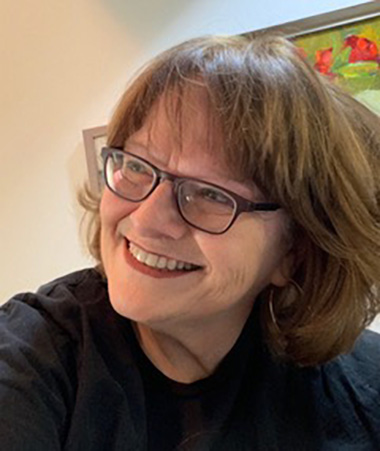Making a Career Choice: Follow in Your Own Footsteps

During my tenure as APS President, I’ve called for broadening the way we train psychological scientists to prepare them for potential careers outside of academia. In my presidential columns for the Observer, I’ve discussed—and invited other leading scientists to discuss—career opportunities in technology, government, and more. In this final presidential column, I’ve asked APS Fellow Barbara Wanchisen, a behavioral scientist with a history of working in public policy, to offer her thoughts on graduate training.
—Wendy Wood, APS President
During a reception at a psychology convention, while surrounded by several academics, I asked, “Are you okay if PhD students say they are interested in nonacademic careers?”
They all nodded affirmatively and smiled politely, as people do at these events. A well-known psychologist from an Ivy League university spoke up enthusiastically, saying, “I think it’s great. Not everyone wants to have a career in academia. Why not?”
I was surprised that he was that open to the idea.
“But what about your students? Are you talking about your students or students in general?” I asked.
“Oh no! Not my students! They follow in my footsteps—they study with me to carry on impactful research. Absolutely not them.”
That discussion happened well over a decade ago, several years after I had left academia and could observe senior academicians from a very different vantage point.
After 16 gratifying years as a university professor, I ended up in Washington, DC as an advocate for behavioral sciences on Capitol Hill and then in a science policy role at the National Academies of Sciences, Engineering, and Medicine. In these latter roles, I worked closely with the academic community, but I was clearly an expat, which gave me new insight into the profession.
The academician I mentioned is far from alone in his view. In a recent survey of STEM PhD students’ interest in various career options, those focused on an academic research career reported a stronger sense of belonging in their department (Sherman et al., 2021). And both students and advisors felt more comfortable discussing academic research career options over industry positions, or even over academic positions involving mostly teaching.
In fairness, there are academics who are open to their students seeking nonacademic opportunities, but they may not know how to advise them effectively. After all, these advisors trained to become academics themselves and, once embroiled in that world, that’s the career trajectory that they know best.
But as graduation approaches, many students are left to figure out what other career options exist for them given the lack of academic posts and their possible changing interest in an academic career path. Some useful advice is out there, but it’s spotty, and a student may have to cast about to find assistance. For example, some former graduates who have landed well may offer advice to the next generation by blogging or publishing articles about their experiences (e.g., PhDLifeBlog). Some scientific organizations, including APS (e.g., Student Notebook) offer advice. These associations also offer well-attended career sessions at their annual conventions.
But whether an academic advisor is in favor of their students seeking nonacademic careers or not, probably the vast majority of advisors want their students to graduate on a high, with a well-deserved diploma and, importantly, exciting prospects for a rewarding career.
Building career planning into the curriculum
Nature takes the bold position that doctoral training is woefully inadequate in many ways, emphasizing a reliance on an outdated 19th-century model of education (“PhD Training Is No Longer Fit for Purpose” [Editorial], 2023). For example, they propose dispensing with the advisor–advisee or “master–apprentice” relationship that cocoons a student into a particular viewpoint with one mentor. Instead, they suggest that students could be assigned several advisors to train a cross-disciplinary approach to research. They also question the classic dissertation as the key written requirement for graduation when other products, such as journal publications, might be a better outcome. Further, they reference the report Towards a Global Core Value System in Doctoral Education (2023), from the League of European Research Universities. The report highlights a variety of countries’ efforts to modernize graduate programming (such as including additional coursework in other fields) while suggesting that doctoral education should be somewhat uniform across all countries that offer such education.
The basic course and lab work in a doctoral curriculum provides a strong base of knowledge, allowing students to develop skills that are useful in many careers. These skills include an ability to gather and analyze information, oral communication, problem solving, written communication, project management, and innovative thinking (Sinche et al., 2017). This strong foundation suggests that a radical change in the curriculum may not be required to meet all students’ career needs. But there are some ways to introduce change into the current PhD curriculum to enhance its effectiveness for all students’ career aspirations.
Exposure to career options
A number of U.S. universities are leaders in this effort. For example, Johns Hopkins University established a career center that caters only to PhD students. Interestingly, approximately 70 universities now partner with a coaching firm called The Versatile PhD to assist their students and faculty (Kowarski, 2022).
A unique partnership between business and academia, Professional Internships for PhD Students (PIPS), is underway at the Norwich Training Park in the United Kingdom. PIPS provides PhD students with hands-on experience with various companies. Students are required to do a 3-month stint in PIPS and receive a paid internship, much like the teaching assistantships prevalent in the traditional doctoral curricula in the United States.
In the United States, the National Institutes of Health supported internships in 2013 and 2014 via their Broadening Experiences in Scientific Training, or BEST, program, designed to broaden training experiences in biomedical fields to reflect the actual workforce (Lenzi et al., 2020). With internship experiences, students graduate with a broader understanding of the job opportunities available to them and less need to take dead-end postdoctoral positions. Internship costs are often negotiated with external partners. Nonetheless, such programs are still not the norm, given that they require time, funds, and advisor support to implement.
Implementation of a new model
Change can be difficult. Therefore, effective leadership is sorely needed. One possible pathway is to involve the Council of Graduate Departments of Psychology, an organization of department chairs that meets annually to address trends and issues in graduate training. If they would adopt careers in psychological science as an ongoing topic, chairs could identify what other schools are doing and attempt change in their own programs. APS and other professional associations could also spearhead an initiative to raise funds to assist students and psychology departments in making necessary additions to the current curricula to support interests in nonacademic careers. Finally, university administrations may also choose to provide funds for such a cause because attracting and retaining strong students benefits all involved in the academic community.
It’s well past time to join this 21st-century movement. Making a few changes to graduate curricula, such as adding summer internships, can have a significant impact. Recognizing the needs of our diverse graduate student body, and the many different jobs available for them, can only strengthen society.
Feedback on this article? Email [email protected] or login to comment.
Fuhrmann, C. N., Halme, D. G., O’Sullivan, P. S., & Lindstaedt, B. (2017). Improving graduate education to support a branching career pipeline: Recommendations based on a survey of doctoral students in the basic biomedical sciences. Life Sciences Education. 10(3). https://doi.org/10.1187/cbe.11-02-0013
Kowarski, I. (2022, November 10). Ph.D. programs that prepare you for work beyond academia. U.S. News. https://www.usnews.com/education/best-graduate-schools/articles/phd-programs-that-prepare-you-for-work-beyond-academia
League of European Research Universities. (2023). Towards a global core value system in doctoral education. https://www.leru.org/news/towards-a-global-core-value-system-in-doctoral-education
Lenzi, R. N., Korn, S. J., Wallace, M., Desmond, N. L., & Labosky, P. A. (2020). The NIH “BEST” programs: Institutional programs, the program evaluation, and early data. The FASEB Journal, 34(3), 3570–3582. https://doi.org/10.1096/fj.201902064
PhD training is no longer fit for purpose—it needs reform now. (2023, January 19). Nature [Editorial], 613, 414. https://doi.org/10.1038/d41586-023-00084-3
Roach, M., & Sauermann, H. (2017). The declining interest in an academic career. PLoS ONE, 12(9), Article e0184130. https://doi.org/10.1371/journal.pone.0184130
Sauermann, H., & Roach, M. (2012). Science PhD career preferences: Levels, changes, and advisor encouragement. PLoS ONE, 7(5), Article e36307. https://doi.org/10.1371/journal.pone.0036307
Sherman, D. K., Ortosky, L., Leong, S., Kello, C., & Hegarty, M. (2021) The changing landscape of doctoral education science, technology, engineering, and mathematics: PhD students, faculty advisors, and preferences for varied career options. Frontiers in Psychology, 12, 1–22. https://doi.org/10.3389/fpsyg.2021.711615
Sinche, M., Layton, R. L., Brandt, P. D., O’Connell, A. B., Hall, J. D., Freeman, A. M., Harrell, J. R., Gowen Cook, J., & Brennwald, P. J. (2017). An evidence-based evaluation of transferable skills and job satisfaction for science PhDs. PLoS ONE, 12(9). Article e0185023. https://doi.org/10.1371/journal.pone.0185023
Resources
The Versatile PhD: https://versatilephd.com
Norwich Research Park: Doctoral Training Partnership:
https://www.norwichresearchpark.com
https://biodtp.norwichresearchpark.ac.uk/the-programme/pips-and-case
PhDLifeBlog: https://phdlife.warwick.ac.uk/2019/07/17/academic-non-academic-lets-talk-careers
APS Student Notebook: https://www.psychologicalscience.org/observer/student-notebook-nonacademic-job-search
American Psychological Association:
https://www.apa.org/education-career/development/how-did-you-get-that-job
https://www.apa.org/workforce/publications/psycpathways
Society for Personality and Social Psychology: https://spsp.org/news/newsletter-articles/nonacademic-internship-experience
Council of Graduate Departments of Psychology: https://cogdop.org






APS regularly opens certain online articles for discussion on our website. Effective February 2021, you must be a logged-in APS member to post comments. By posting a comment, you agree to our Community Guidelines and the display of your profile information, including your name and affiliation. Any opinions, findings, conclusions, or recommendations present in article comments are those of the writers and do not necessarily reflect the views of APS or the article’s author. For more information, please see our Community Guidelines.
Please login with your APS account to comment.